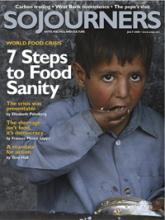The price of everything has gone up, from fertilizer to gasoline. People in India and China are demanding a better kind of food, including meat, which means that it takes more grain to feed the populations in those countries. The crop yield is down in Africa. There are droughts going on, especially in Australia. On top of that is the cost of energy and the cost of ethanol. It’s all come together, in a very dangerous way, and as a result we’ve got a major problem here. Wheat is at a 28-year high. Rice used to be $300 a metric ton, but lately it’s well over $1,000.
I’ve traveled to places around the world, and I’ve seen people rioting and starving. At a time when we need more aid, Congress is cutting back, including funds for the McGovern-Dole program [the McGovern-Dole International Food for Education Program was reduced from $840 million to $84 million in the 2008 Farm Bill]. The McGovern-Dole program in the short term is very important because that is emergency food aid. It goes to a lot of school feeding programs. That needs to be resurrected, but we also need to do a much better job of getting that food out to some of these nations that are facing riots.
Addressing the crisis gets back to political and spiritual will. World leaders from the United Nations, along with our own president, Prime Minister [Gordon] Brown from England, and some others, will have to get together in a pledging conference, and get serious about what’s going on. They can’t just talk about cutting in half the number of hungry people by the year 2015, because we’re going to miss that. We’re not even coming close. We need to address the issue now—not in 2015, but right now. As they said under President Roosevelt, people don’t eat in the “long run,” they eat now.
Read the Full Article

